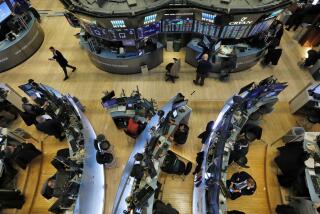Brazil Shifts Trading Hours to Align With U.S.
- Share via
In a move that highlights how closely its fortunes are tied to the U.S., Brazil’s stock exchanges on Wednesday shifted trading hours so they won’t be whipsawed by wild market swings before U.S. stocks start trading.
The Sao Paulo stock exchange, known as the Bovespa index, and the Rio de Janeiro exchange delayed opening by two hours to noon, or 9 a.m. Eastern Standard Time, and extended closing by one hour to 6 p.m., or 3 p.m. Eastern Standard Time.
The move brings trading more closely in line with the U.S. and follows several days of frenetic activity that culminated in a gut-wrenching 10% drop within three minutes of the opening bell Tuesday.
“We made decontaminating the situation a priority so we won’t get penalized because of our time difference,” said Francisco Costa e Silva, president of the Comissao de Valores Mobiliarios, the country’s securities and exchange commission.
Indeed, the shift illustrates how growing economic and financial links, spurred by the wired world of global finance, have closed the distance between major markets in the U.S. and Europe and their smaller counterparts in Latin America.
“Now, we are officially tied with New York,” said Gilberto Zalfa, a fund manager at Agenda Brokerage in Rio. “Until [Tuesday], it was informal. Bovespa finally admitted that if New York goes down, we go down.”
On Wednesday, however, the Bovespa index fell sharply again in spite of modest gains on Wall Street and an overnight rebound in Hong Kong. The index of 51 leading shares tumbled 6.02% through the key 10,000-point barrier to close at 9,818 points.
One effect of the schedule change will be to limit the ability of investors in Brazil to take direction from the U.S. market. Previously, investors have watched trading in American depositary receipts the day before to gauge where the Brazilian market should open.
“In good times, it should help,” said Marcos Camargo, vice president of Salomon Bros. in New York. “In bad times, it could increase volatility.”
Mexico, facing similar pressure from overseas trading, adjusted its opening and closing times in 1994 to match New York’s hours. In large part, the move was due to the growing number of Mexican companies listing shares in the U.S.
Now Brazilian companies have established similar programs to have their shares traded in the United States. There are now 60 Brazilian ADRs, up from 35 in 1995, according to Guzman & Co., a Miami-based firm that tracks ADRs.
On top of shifting their schedules, Brazil’s stock exchanges also implemented a series of new rules similar to those adopted in the U.S. after markets plunged here in 1987. The measures are aimed at stemming drastic movements after stocks accumulated a 19% plunge over the last four days. The drop in Brazilian shares was second only to Hong Kong’s plunge during the period.
Under the new rules, a drop of 10% in relation to the previous session’s close will result in the suspension of trading for 30 minutes. A drop of 15% will suspend trading for one hour.
(BEGIN TEXT OF INFOBOX / INFOGRAPHIC)
Wild Days for World Stocks
Asian markets rebounded Wednesday following Wall Street’s surge on Tuesday, but Brazilian shares turned sharply lower again. Index trends on some key world markets over the past four days, grouped by region:
*--*
Country index Fri. Mon.* Tues.* Wed. U.S. (S&P; 500) -1.0% -6.9% +5.1% -0.3% Brazil (Bovespa) -3.0% -15.0% +6.4% -6.0% Mexico (Bolsa) -2.8% -13.3% +11.7% +0.7% France (CAC-40) -0.3% -2.8% -4.3% +6.3% Germany (DAX-30) +1.9% -4.2% -8.0% +6.3% Hong Kong (Hang Seng) +6.9% -5.8% -13.7% +18.8% Indonesia (composite) -0.8% -0.1% -8.8% +5.4% Japan (Nikkei 225) +1.2% -1.9% -4.3% +3.3% Malaysia (composite) -2.0% +0.1% -6.6% +2.3% S. Korea (composite) -5.5% -7.1% -6.6% +2.3%
*--*
* Percentage change
Source: Bloomberg News
More to Read
Sign up for Essential California
The most important California stories and recommendations in your inbox every morning.
You may occasionally receive promotional content from the Los Angeles Times.













